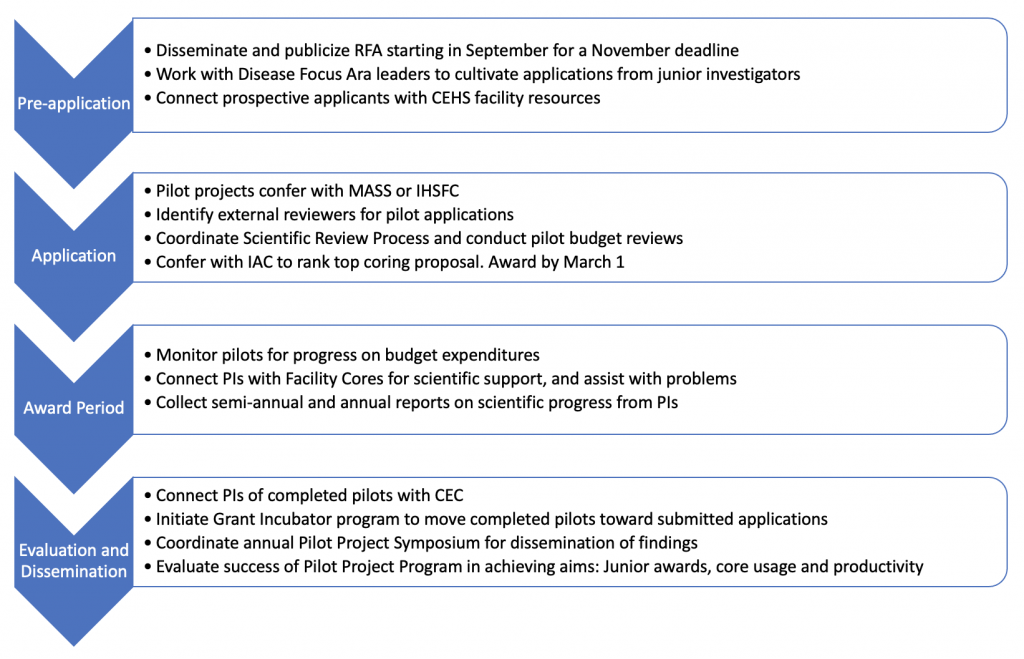Pilot Projects Program
About
The Pilot Projects Program (PPP) is a high-impact and strategic initiative of the Center for Environmental Health and Susceptibility (CEHS). Its mission is to (1) cultivate innovative, transdisciplinary environmental health research, (2) support junior investigators and incentivize experienced investigators in conducting environmental health and susceptibility-related research, (3) integrate researchers with CEHS facility cores to support novel investigations capable of generating advancements in environmental health research, and (4) provide opportunities for research translation that impacts the health of North Carolinians. In consultation with the Administrative Core and the Internal Advisory Committee, the PPP director coordinates, administers, tracks and evaluates the program.
The PPP has four phases: Pre-application, Application, Award Period, and Dissemination & Evaluation. Within these phases, CEHS personnel and faculty leaders distribute the RFA, connect researchers with core facilities, coordinate the scientific review of pilot applications, monitor active projects for progress and budget expenditures, and connect researchers with the Community Engagement Core (CEC) for community-level dissemination opportunities. The program includes three mechanisms: Team Science awards of $50,000 (2-3 per year); Single Investigator awards of up to $25,000 (3-5 per year); and, Rapid Response awards of up to $2,500 and 1-2 per year.

If you are ready to apply, please review the opportunities below:
Applications are particularly encouraged from primary investigators at the assistant or associate level. All applications are evaluated for the likelihood of developing their pilot project into a full NIEHS grant application.
- Single Investigator and Interdisciplinary Team Pilot Projects: Applications are due in early November.
- Rapid Response Seed Grant Pilot Projects: Rapid response funds are used to provide financial and technical assistance quickly to eligible investigators needing short-term (less than 1 year) and specific assistance generating preliminary data that will lead to new R-series NIH grant proposals. The application deadline is continuously open while funds are available.
In addition to Pilot Project funding opportunities, the Center also offers investigators an invitation to apply for Method Development grants. This funding mechanism provides up to $5,000 per project (20% maximum for supplies; remainder for method development) to develop innovative and novel assays and methods related to the health effects of environmental exposures. Eligible PIs must hold a UNC faculty appointment or other appointment authorized to serve as PI on an externally sponsored research project. Priority will be given to assistant or associate professors with outstanding proposals. Applications are accepted on a rolling basis and reviewed by the CEHS Internal Advisory Committee.
New Environmental Health Sciences (EHS) Innovator Initiative
In an effort to create career development and mentoring opportunities to strengthen the environmental sciences workforce, CEHS is please to support the New EHS Innovator Initiative. This Innovator award will help recruit and train the next generation of environmental health scientists. Annually, one (1) new EHS Innovator will be chosen and will receive financial support and direct mentoring from the CEHS leadership team to promote the development of scientific and leadership skills. Eligibility includes early to early-mid career faculty (Assistant Professors and Associate Professors in the first 5 years at that rank), including fixed-term and tenure track faculty, in the field of environmental exposure research are eligible to participate. Non-faculty community partners engaged in significant environmental exposure research may also be considered eligible, after consultation with CEHS leadership. Find details here.
Closed for Applications
The CEHS cultivated the Rising Star initiative to support promising junior faculty for career development training and travel. These Rising Star awards provide $10,000 in financial support for a career development plan reviewed by senior faculty mentors and include funds for the collection of pilot data and/or pursuit of supplemental training, invitations to key collaborators. Selected Rising Star participants will receive financial support and direct mentoring from the CEHS leadership group to promote the development of scientific and leadership skills. For more details about program selection criteria and eligibility requirements, visit our Rising Stars Page.
Recently Awarded Pilot Projects
- CEHS Pilot Project Archives
CEHS Pilot Project Archives
- 2020-2021 CEHS Pilot Projects
- 2019-2020 CEHS Pilot Projects
- 2018-2019 CEHS Pilot Projects
- 2017-2018 CEHS Pilot Projects
- 2016-2017 CEHS Pilot Projects
- 2014-2015 CEHS Pilot Projects
- 2013-2014 CEHS Pilot Projects
- 2012-2013 CEHS Pilot Projects
- 2011-2012 CEHS Pilot Projects
- 2010-2011 CEHS Pilot Projects
- 2009-2010 CEHS Pilot Projects
- 2008-2009 CEHS Pilot Projects
- 2007-2008 CEHS Pilot Projects
- 2006-2007 CEHS Pilot Projects
- 2005-2006 CEHS Pilot Projects
- 2004-2005 CEHS Pilot Projects
- 2003-2004 CEHS Pilot Projects
- 2002-2003 CEHS Pilot Projects
- 2001-2002 CEHS Pilot Projects
